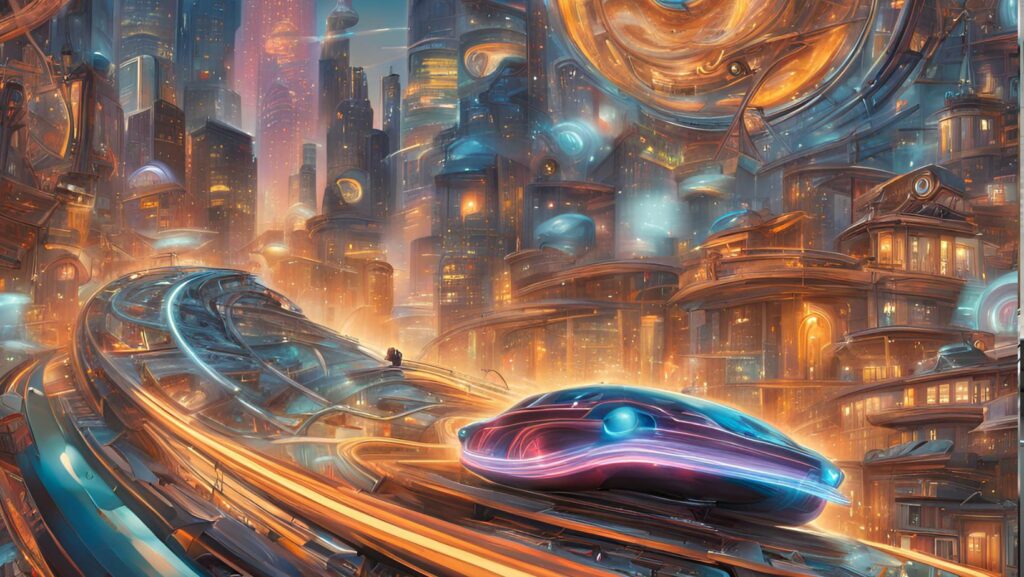Time travel has long captivated imaginations, weaving its way through science fiction and philosophical debates. Recently, the buzz around time travel news has intensified, sparking both excitement and skepticism. Scientists, inventors, and enthusiasts are exploring the boundaries of time manipulation, igniting discussions that blur the lines between reality and fantasy.
As advancements in technology and theoretical physics unfold, the prospect of time travel moves from mere speculation to potential reality. From groundbreaking research in quantum mechanics to innovative experiments, the quest to understand time continues to evolve. This article delves into the latest developments in time travel news, shedding light on what’s possible and what lies ahead in this fascinating field.
Time Travel News
Recent articles outline significant strides in time travel research, particularly in quantum mechanics. Researchers are exploring the concept of time loops and wormholes, focusing on ways to manipulate spacetime for potential time travel experiences.
Innovative experiments in particle physics demonstrate intriguing results, where particles appear to communicate across time. These findings illustrate possibilities for future theoretical models that may reframe current understanding of time.
NASA’s recent announcements emphasize interest in Time Dilation effects as further evidence supporting time travel theories. Studies reveal varying time perceptions based on gravitational forces, inviting further investigations into practical applications.
Major scientific conferences now regularly feature time travel discussions, attracting physicists and theorists. Panelists present educated theories alongside mathematical equations exploring causality and temporal paradoxes.
Experts theorize about the implications of time travel on history and human experience. The potential for altering significant historical events raises ethical questions, prompting deeper philosophical debates within the academic community.
Overall, advancements in technology and theoretical physics contribute to a vibrant dialogue on time travel. Scientists remain divided on feasibility, yet ongoing research continues to inspire curiosity and exploration in the quest for understanding time.
Scientific Advancements
Recent developments in the realm of time travel have sparked interest among scientists and researchers. They explore various theories and conduct experiments that could potentially reshape the understanding of time and its manipulation.
New Theories in Time Travel
New theoretical frameworks are emerging that challenge earlier perceptions of time travel. Concepts such as closed timelike curves suggest that spacetime can bend back on itself, creating possibilities for travel to the past. Quantum mechanics plays a pivotal role in these discussions, with theories like the Many-Worlds Interpretation proposing parallel universes as a way to navigate historical timelines without disrupting causality. String theory also contributes to the dialogue, implying that additional dimensions could provide pathways for temporal navigation. Recent papers from physicists present models for wormholes, theoretical passages that could connect disparate points in time and space, further expanding the potential for time travel.
Notable Experiments and Results
Groundbreaking experiments have yielded intriguing results in the field of time travel research. In particle physics, experiments at facilities like CERN have captured evidence of quantum entanglement, where particles appear to communicate instantaneously across time, hinting at non-linear time behaviors. Researchers at various institutions are also probing time dilation effects through experiments involving atomic clocks placed at different gravitational fields, demonstrating that time progresses at varying rates based on mass and motion. NASA’s studies on gravitational waves further reinforce the understanding of time as a dynamic entity, revealing interactions that could theoretically influence temporal passage. These experiments and findings represent significant steps toward unraveling the mysteries surrounding time travel, fueling scientific curiosity and ongoing debates.
Cultural Impact of Time Travel
Time travel’s intriguing premise significantly influences culture, shaping narratives in media and literature while reflecting public interest. Its allure draws both fascination and debate regarding its implications.
Time Travel in Media and Literature
Time travel frequently appears in media and literature, becoming a staple in science fiction narratives. Renowned works include “The Time Machine” by H.G. Wells and “Back to the Future” franchise, which explore the consequences of altering time. Recent series like “Dark” and “The Umbrella Academy” delve into complex timelines, examining causality and alternate realities. These narratives often raise thought-provoking questions about morality and identity, resonating with audiences.
Cinematic portrayals also influence societal perceptions, with time travel depicted as a thrilling adventure or a cautionary tale. Themes of nostalgia and regret emerge in films like “Interstellar,” highlighting emotional stakes associated with time manipulation. The saturation of time travel tropes in various media serves to enhance public awareness and curiosity about the concept, fueling ongoing discussions about its scientific plausibility.
Public Perception and Interest
Public perception of time travel oscillates between fascination and skepticism. While enthusiasts embrace time travel as a tantalizing possibility, skeptics question its feasibility and ethical ramifications. Polls indicate a growing intrigue, with approximately 60% of respondents expressing interest in the concept, often driven by advancements in scientific research and popular media portrayals.
Social media plays a crucial role in shaping conversations around time travel, allowing for rapid dissemination of information and theories. Online forums and platforms facilitate discussions among enthusiasts and skeptics, enhancing community engagement. As new scientific findings emerge, such as NASA’s studies on time dilation, public interest continues to rise, encouraging further exploration of the cultural implications tied to time travel.
Time Travel Technologies
Recent innovations in time travel technologies exhibit a blend of theoretical exploration and experimental advancements, igniting interest among physicists and futurists alike.
Current Innovations
Current innovations in time travel research focus on quantum mechanics, particularly in studies involving time loops and wormholes. Researchers at institutions like MIT are exploring the feasibility of traversable wormholes, which could theoretically allow travel between different points in spacetime. Experiments at CERN with particle collisions indicate particles displaying non-local interactions, suggesting communication across time, which may lead to new temporal models. Additionally, NASA’s research into gravitational time dilation continues to provide insights, showcasing how varying gravitational fields affect time flow. These discoveries not only challenge conventional understanding but also open pathways for practical applications of time travel technologies.
Future Possibilities
Future possibilities in time travel hinge on advancements in quantum physics and breakthroughs in engineering. Theoretical physicists are increasingly optimistic about developing time machines based on concepts like negative energy and closed timelike curves. Significant collaborations among universities aim to prototype devices capable of manipulating spacetime fabric. If innovations in quantum computing progress as anticipated, they might facilitate simulations of time travel scenarios, enhancing understanding of causality and temporal mechanics. Ethical discussions surrounding potential time travel applications prompt considerations about altering historical events and their impact on society. The ongoing research landscape signals a transformative era in time travel technology, with implications that extend far beyond scientific inquiry.
Ethical Considerations
Ethical considerations surrounding time travel encompass various implications and debates, particularly regarding its potential impact on society and history.
Implications of Time Travel
Time travel raises significant ethical dilemmas, especially in how it could alter historical events. Interventions in pivotal moments may lead to unintended consequences, fundamentally changing the trajectory of human history. For example, changes to major events, such as wars or technological discoveries, could undermine the lessons learned from those occurrences. Furthermore, the potential to alter personal timelines introduces challenges in dealing with identity and existence. Questions arise regarding the moral responsibility of individuals who possess the ability to navigate time and the effects of their choices on future generations.
Debates in the Scientific Community
The scientific community engages in ongoing debates about the feasibility and responsibilities associated with time travel. Some experts argue that even discussing time travel leads to ethical dilemmas, emphasizing the need for strict regulations should it become possible. Concerns about the misuse of time travel capabilities create divisions among physicists, with some advocating caution while others propose exploring the concept’s limits. Importantly, discussions on causality—how changes in the past could affect the present—highlight the complexities of time manipulation. These debates not only foster a deeper understanding of time travel’s theoretical foundation but also underscore the necessity of developing ethical frameworks guiding related research and potential applications.

